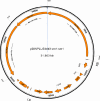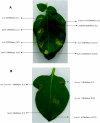Functional stacking of three resistance genes against Phytophthora infestans in potato - PubMed (original) (raw)
Functional stacking of three resistance genes against Phytophthora infestans in potato
Suxian Zhu et al. Transgenic Res. 2012 Feb.
Abstract
Functional stacking of broad spectrum resistance (R) genes could potentially be an effective strategy for more durable disease resistance, for example, to potato late blight caused by Phytophthora infestans (Pi). For this reason, three broad spectrum potato R genes (Rpi), Rpi-sto1 (Solanum stoloniferum), Rpi-vnt1.1 (S. venturii) and Rpi-blb3 (S. bulbocastanum) were selected, combined into a single binary vector pBINPLUS and transformed into the susceptible cultivar Desiree. Among the 550 kanamycin resistant regenerants, 28 were further investigated by gene specific PCRs. All regenerants were positive for the nptII gene and 23 of them contained the three Rpi genes, referred to as triple Rpi gene transformants. Detached leaf assay and agro-infiltration of avirulence (Avr) genes showed that the 23 triple Rpi gene transformants were resistant to the selected isolates and showed HR with the three Avr effectors indicating functional stacking of all the three Rpi genes. It is concluded that Avr genes, corresponding to the R genes to be stacked, must be available in order to assay for functionality of each stack component. No indications were found for silencing or any other negative effects affecting the function of the inserted Rpi genes. The resistance spectrum of these 23 triple Rpi gene transformants was, as expected, a sum of the spectra from the three individual Rpi genes. This is the first example of a one-step approach for the simultaneous domestication of three natural R genes against a single disease by genetic transformation.
Figures
Fig. 1
Graphical view of binary vector pBINPLUS:_Rpi_-blb3:_Rpi_-vnt1.1:_Rpi_-sto1. Restriction enzyme cleavage sites, used for cloning of the Rpi genes into pBINPLUS have been indicated
Fig. 2
Agro-infiltration of Avr effectors in triple Rpi gene regenerant A14 Z-22 using different densities of inoculum. Clear HR reactions were observed at all densities for Avr2, IpiO1 and Avrvnt1. Co-infiltration of R3a/Avr3a, and vnt1.1/_Avrvnt_-1 served as a positive controls. Empty vector pGRAB, and Agrobacterium strain AGL1 were negative controls. a Showed the infiltration with Avr2 and IpiO1. b Showed the infiltration with Avrvnt1
Similar articles
- Development of late blight resistant potatoes by cisgene stacking.
Jo KR, Kim CJ, Kim SJ, Kim TY, Bergervoet M, Jongsma MA, Visser RG, Jacobsen E, Vossen JH. Jo KR, et al. BMC Biotechnol. 2014 May 29;14:50. doi: 10.1186/1472-6750-14-50. BMC Biotechnol. 2014. PMID: 24885731 Free PMC article. - Rpi-vnt1.1, a Tm-2(2) homolog from Solanum venturii, confers resistance to potato late blight.
Foster SJ, Park TH, Pel M, Brigneti G, Sliwka J, Jagger L, van der Vossen E, Jones JD. Foster SJ, et al. Mol Plant Microbe Interact. 2009 May;22(5):589-600. doi: 10.1094/MPMI-22-5-0589. Mol Plant Microbe Interact. 2009. PMID: 19348576 - Introgression of Two Broad-Spectrum Late Blight Resistance Genes, Rpi-Blb1 and Rpi-Blb3, From Solanum bulbocastanum Dun Plus Race-Specific R Genes Into Potato Pre-breeding Lines.
Rakosy-Tican E, Thieme R, König J, Nachtigall M, Hammann T, Denes TE, Kruppa K, Molnár-Láng M. Rakosy-Tican E, et al. Front Plant Sci. 2020 Jun 3;11:699. doi: 10.3389/fpls.2020.00699. eCollection 2020. Front Plant Sci. 2020. PMID: 32670309 Free PMC article. - Late blight resistance genes in potato breeding.
Paluchowska P, Śliwka J, Yin Z. Paluchowska P, et al. Planta. 2022 May 16;255(6):127. doi: 10.1007/s00425-022-03910-6. Planta. 2022. PMID: 35576021 Free PMC article. Review. - Solanum resistance genes against Phytophthora infestans and their corresponding avirulence genes.
Rodewald J, Trognitz B. Rodewald J, et al. Mol Plant Pathol. 2013 Sep;14(7):740-57. doi: 10.1111/mpp.12036. Epub 2013 May 24. Mol Plant Pathol. 2013. PMID: 23710878 Free PMC article. Review.
Cited by
- Plant pattern recognition receptors: from evolutionary insight to engineering.
Snoeck S, Johanndrees O, Nürnberger T, Zipfel C. Snoeck S, et al. Nat Rev Genet. 2024 Nov 11. doi: 10.1038/s41576-024-00793-z. Online ahead of print. Nat Rev Genet. 2024. PMID: 39528738 Review. - Resistance Mechanisms of Plant Pathogenic Fungi to Fungicide, Environmental Impacts of Fungicides, and Sustainable Solutions.
Islam T, Danishuddin, Tamanna NT, Matin MN, Barai HR, Haque MA. Islam T, et al. Plants (Basel). 2024 Sep 30;13(19):2737. doi: 10.3390/plants13192737. Plants (Basel). 2024. PMID: 39409607 Free PMC article. Review. - Identification of New Isolates of Phytophthora sojae and Selection of Resistant Soybean Genotypes.
Heo SV, Park HR, Jang YW, Park J, Kang BK, Seo JH, Kim JH, Lee JY, Choi MS, Ko JY, Kim CS, Lee S, Jun TH. Heo SV, et al. Plant Pathol J. 2024 Jun;40(3):329-335. doi: 10.5423/PPJ.NT.12.2023.0181. Epub 2024 Jun 1. Plant Pathol J. 2024. PMID: 38835304 Free PMC article. - T-DNA characterization of genetically modified 3-R-gene late blight-resistant potato events with a novel procedure utilizing the Samplix Xdrop® enrichment technology.
Zarka KA, Jagd LM, Douches DS. Zarka KA, et al. Front Plant Sci. 2024 Feb 14;15:1330429. doi: 10.3389/fpls.2024.1330429. eCollection 2024. Front Plant Sci. 2024. PMID: 38419775 Free PMC article. - CRISPR/Cas StNRL1 gene knockout increases resistance to late blight and susceptibility to early blight in potato.
Nourozi M, Nazarain-Firouzabadi F, Ismaili A, Ahmadvand R, Poormazaheri H. Nourozi M, et al. Front Plant Sci. 2024 Jan 18;14:1278127. doi: 10.3389/fpls.2023.1278127. eCollection 2023. Front Plant Sci. 2024. PMID: 38304452 Free PMC article.
References
- Agrawal PK, Kohli A, Twyman RM, Christou P. Transformation of plants with multiple cassettes generates simple transgene integration patterns and high expression levels. Mol Breed. 2005;16:247–260. doi: 10.1007/s11032-005-0239-5. - DOI
- Altpeter F, Baisakh N, Beachy R, Bock R, Capell T, Christou P, Daniell H, Datta K, Datta S, Dix PJ, Fauquet C, Huang N, Kohli A, Mooibroek H, Nicholson L, Nguyen TT, Nugent G, Raemakers K, Romano A, Somers DA, Stoger E, Taylor N, Visser RGF. Particle bombardment and the genetic enhancement of crops: myths and realities. Mol Breed. 2005;15:305–327. doi: 10.1007/s11032-004-8001-y. - DOI
- Andreu AB, Caldiz DO, Forbes GA. Phenotypic expression of resistance to Phytophthora infestans in processing potatoes in Argentina. Am J Pot Res. 2010;87:177–187. doi: 10.1007/s12230-009-9121-z. - DOI
- Armstrong MR, Whisson SC, Pritchard L, Bos JIB, Venter E, Avrova AO, Rehmany AP, Bohme U, Brooks K, Cherevach I, Hamlin N, White B, Fraser A, Lord A, Quail MA, Churcher C, Hall N, Berriman M, Huang SW, Kamoun S, Beynon JL, Birch PRJ. An ancestral oomycete locus contains late blight avirulence gene Avr3a, encoding a protein that is recognized in the host cytoplasm. PNAS. 2005;102:7766–7771. doi: 10.1073/pnas.0500113102. - DOI - PMC - PubMed
Publication types
MeSH terms
LinkOut - more resources
Full Text Sources
Other Literature Sources
Research Materials
Miscellaneous

